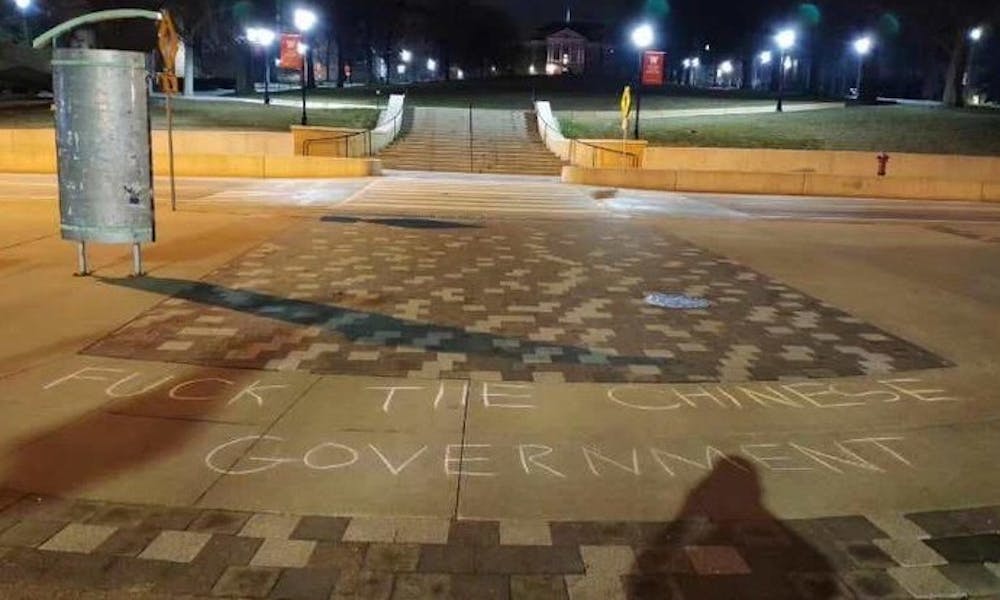Discriminatory chalk writing that appeared late Wednesday night sparked frustration and fear among UW-Madison’s Asian and Asian-American community — and prompted the university to again emphasize its stance against racist actions.
“It’s from China, #ChineseVirus” and “F*** the Chinese Government” was chalked on the sidewalk in front of Walgreens on State Street and Bascom Hill. Signs were washed off by a group of students the following morning.
Students started raising the issue of discrimination against Asian and Asian-American communities in February after UW-Madison announced its first case of coronavirus.
One month later, incidents like this demonstrate blatant discrimination occurring in Madison alongside Pres. Donald Trump's choice of calling COVID-19 the “Chinese Virus.”
It is unclear who wrote this and exactly when it happened. However, Muyang Deng took photos of the chalk and shared them in the Chinese international student group chat around 2 a.m. Thursday.
Julia Tan, who is a member of the group chat, was shocked by the images Deng sent.
“This is not acceptable and it is very terrifying. If I were still on campus now, I would be so scared to leave my apartment,” Tan said.
However, Tan — who is originally from Beijing, China — is one of the few international students who has a stable extended family in the country where she can stay off-campus and continue her academics.
Most international students’ only permanent home in the US is on UW-Madison's campus, and they are unable to get back to their families during this pandemic.
There have been 81 bias reports so far in 2020 — 47 of those were made by Asian American and Asian international students at UW-Madison, according to the assistant director of Bias Response Jenna Friedman.
Tao Zhou, who is a senior studying economics with a certificate in photography and video production, shared the most recent incident on Instagram.
“This is not okay. I’m calling for non-discrimination in this global crisis on campus, because no matter who you are, we are all in this together. We should send love and care more about each other, instead of hate,” Zhou captioned her post.
Other students are reposting the images and urging the university to do the same on their official social media accounts to raise awareness of anti-Asian discrimination and hate.

The university has apologized to Zhou, personally, that she and other fellow students have had to endure racism such as this.
“No one person, country, or ethnicity created this pandemic—disease does not discriminate,” Chancellor Blank stated in the email to all students and faculty. “We want to be clear that racist behaviors or stereotyping of any kind are not tolerated at UW–Madison—no matter if we are online, passing others in public, or quarantined at home.”
In addition to Blank's email, the university hosted a virtual town hall in response to the current campus climate Thursday afternoon.
Approximately 350 people logged on for the town hall hosted by the Dean of Students Office, in partnership with the Multicultural Student Center, International Student Services and the Division of Diversity, Equity and Educational Achievement.
During the town hall, students shared concern about the growing racism and xenophobia that targets the Asian and Asian-American community — particularly those who perceived as being of Chinese or East Asian descent — and they questioned the action UW-Madison plans to take to address the issue and foster a more inclusive community.
“We are here for students and here to let them know that [any discriminatory] behavior is not tolerated at UW-Madison,” Dean of Students Christina Olstad said. “We can do better than this.”
Professor Cindy Cheng from the Asian-American Studies Program also used the meeting to urge the Asian and Asian American communities to remember to create love and support for each other and themselves.
Students are encouraged to file a bias incident report and employees can file a complaint with the Office of Compliance if they experience harassment or discrimination.
There are also free university mental health resources, including SilverCloud for anxiety and stress management; the Center for Healthy Minds for resilience and mindfulness training; and LifeMatters through the Employee Assistance Office for employees seeking assistance with life, work, family and well-being.
The Division of Diversity, Equity & Educational Achievement will host another virtual town hall meeting Friday afternoon from 12 p.m. to 1 p.m. in support of Asian and Asian-American students, faculty and staff members. This is a chance for everyone to hear university community members, voice concerns regarding the campus climate, ask questions and share experiences.






